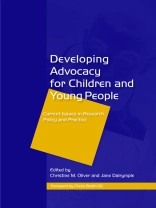The role of an advocate for children is one that I perform myself which is why I have found much of the research presented in this book so interesting… We are all on the same side battling to improve life for children who have, through no fault of their own, been handed a very bad set of cards.’
– From the Foreword by Cherie Booth QC
Advocacy for vulnerable people is increasingly becoming a part of health and social care practice, and over the past decade policy developments have contributed to a rapid development of advocacy services for children and young people.
This book explores the latest debates and findings relating to research and practice in the field of children and young people’s advocacy. Contributors present the key issues and dynamics of current advocacy practice and examine its role within health, education and social care services, including its impact on inter-professional collaboration, the development of personalised services and the barriers and facilitators to children’s participation in children’s services.
This book will be valued by any professional working with young people, including children and young people’s advocates, health and social care professionals, teachers and youth workers.
สารบัญ
Foreword. 1. Concepts, Public Policy and Research. Christine M. Oliver, Institute of Education, University of London, UK, and Jane Dalrymple, University of the West of England, Bristol, UK. 2. Setting the Scene: Funding, Patterns of Advocacy Provision and Children’s Access to Advocacy Services. Christine M. Oliver, Institute of Education, University of London, UK. 3. An Analysis of the Role of Advocacy in Promoting Looked After Children’s Participation in Statutory Reviews. Jane Boylan, Keele University, UK. 4. Advocacy in Child Protection Case Conferences. Jane Dalrymple, Institute of Education, University of London, UK, and Hilary Horan, Barnardo’s, UK. 5. At the Table or Under the Table? Children’s Participation in Family Group Conferences – A Comparative Study of the Use of Professional Advocates and Family Supporters. Sophie Laws and Perpetua Kirby, Consultant Researchers, UK. 6. Challenges and Complexities of Widening Access to Advocacy Services: Lessons from an Evaluation of Voice Advocacy Service. Elaine Chase, Institute of Education, University of London, UK. 7. Providing Advocacy for Disabled Children, Including Children Without Speech. Abigail Knight, Institute of Education, University of London, UK, and Christine M. Oliver. 8. Complaints and Children’s Advocacy in Wales – Getting Behind the Rhetoric. Andy Pithouse, Cardiff University, UK and Ann Crowley, Consultant Researcher, UK. 9. Advocacy and Complaints Procedures: The Perspectives of Young People. Ann Crowley, Concultant Researcher, UK, and Andy Pithouse, Cardiff University, UK.. 10. The Family Court Process: Young People, Care Proceedings and Advocacy. Maureen Winn Oakley, National Youth Advocacy Service Children’s Commissioner, Sandwell, UK, and Birmingham Children’s Rights Service, UK. 11. The Impact of Advocacy. Christine M. Oliver, Institute of Education, University of London, UK. 12. Advocacy, Participation and Voice. Jane Dalrymple, University of the West of England, Bristol, UK, and Christine M. Oliver, Institute of Education, University of London, UK. Contributors. Subject Index. Author Index.
เกี่ยวกับผู้แต่ง
Abigail Knight has been a researcher at the Institute of Education, University of London since 1995. Her research interests include the health and wellbeing of looked-after children and young people, disabled children and their families, and children’s rights.












